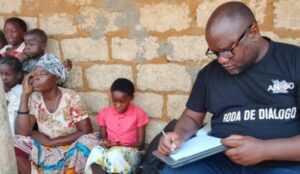In the penultimate of our six weeks of reflections leading up to the birthday of Aguchita on June 13, we continue to share reflections on how her life and ministry echoed each of the six areas of intervention for the Congregation – long before they were defined in our Position Papers. This week, we reflect on Aguchita’s approach to Economic Justice.
Aguchita wanted each woman to identify her own unique skills and develop them in order to take advantage of them in the best way possible. In the following excerpt, adapted from the book Aguchita: Mercy and Justice, we read how Aguchita worked to develop sustainable strategies for economic development with local communities, ensuring that income generation was pragmatic and effective for women and their families.
When the women did not have enough money to buy food for their children, Aguchita encouraged them to embroider and sew and sell the items they had made. Some women knitted sweaters, others made shoes, and others baked. Once they had finished their items, they went about selling them, thus managing to cover the cost of the basics they needed. As one of them recalled: “At least then we had something to buy food with.” If any money was left over, it was added to the kitty to try to teach them “how to save cent by cent.”
The Congregation’s position on economic justice calls for us to increase our capacity to understand the dynamics of global economic exclusion, advocate for economic improvement and social transformation, and expand programs and initiatives that bring practical relief from poverty.
One such program is the Euphrasia Women’s Center in Kenya where we respond to the needs of women and girls from the slums through education and income-generating programs to support them towards a path of economic stability and self-reliance.
Aguchita was pragmatic in how she facilitated the women to use and develop their skills to become economically empowered and was wise in teaching them how to save for the future. Hers was not a quick-fix response but rather one that worked towards long-term social and economic relief.
In your life and mission, what contribution do you make towards economic justice? What can you learn from Aguchita’s approach?







